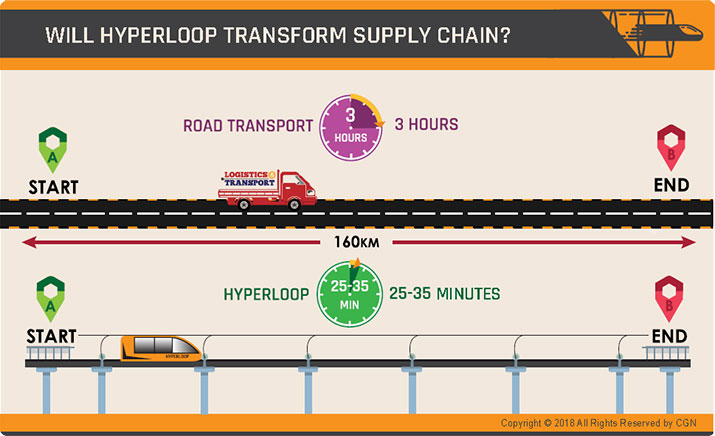

Will Hyperloop Transform Supply Chain?
The term ‘Hyperloop’ has become a buzz word in transportation, with many forums suggesting it as one of the best modes for reducing transportation time for goods by over 80%. If deployment of robots in the manufacturing floor was considered a transformation, hyperloop is going to set the next wave of transformation effect on the supply chain.
What is hyperloop?
Hyperloop is a proposed fifth mode of transportation where pods or containers travel at high speed at around 700 miles per hour through a tunnel which is pumped into near vacuum. Does this does sound a like a super-fast movement in a Hollywood movie? The industry is not very far away from implementing this technology and expected to be operational over the next five years. The plan is to transport goods and people using Hyperloop, this article will focus only on the goods movement and the related benefits and implications on supply chain.
How it will transform the supply chain?
Hyperloop’s super-fast speed is a great advantage for implementing Just-In-Time inventory practices. The organizations can plan around holding less inventory, decreasing the warehouse footprint and the associated operational and overhead costs. It is estimated that the transporters can move twenty times as much cargo at fractional costs per kilo, which also means that cargo will need to be packaged, loaded, unloaded and distributed from manufacturing location to hyperloop stations more quickly and effectively.
The cost of building a hyperloop is estimated to be significantly less than constructing a high- speed railway line for the same distance. As the route is 100% electric, the greenhouse gas emissions may be lowered by up to 86,000 tons over 30 years. There are some technological and regulatory hurdles in implementation, but they are eventually expected to be overcome. Given the cost benefits in setting up and managing the infrastructure and the fact that there are already six private players in the race, the Hyperloop seems to be a winning candidate.
Conclusion
Though the technology is in the initial stages of commercialization, India might be the first country to get Hyperloop operational within the next 5 years. This would be a major paradigm shift to generate tremendous opportunities for the market players in the areas of supply chain planning and inventory management.
References
https://www.telegraph.co.uk/technology/0/hyperloop-will-future-transport
https://www.quora.com/Could-Hyperloop-One-transform-Indian-freight-transport-by-2021
https://www.ambitek.co.uk/news/blog/is-it-time-to-get-hyper-about-the-hyperloop
http://www.worldconstructionnetwork.com/news/virgin-to-build-india-s-first-hyperloop-between-mumbai-and-pune

What we found interesting
"Here is an interesting video about Hyperloop"


25eb.png?width=203&name=CGN_Tagline1%20(1).png)